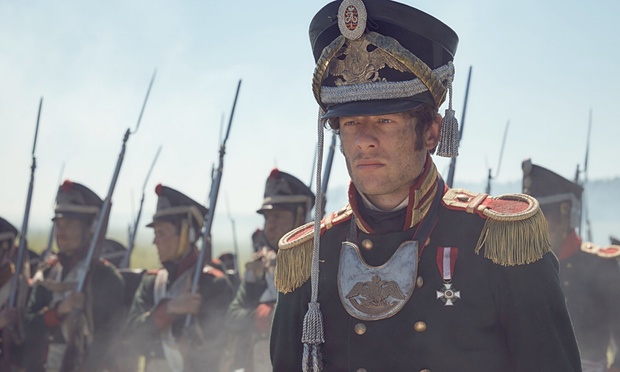Gosh what a breath of fresh air was Andrew Davies’s War & Peace adaptation (BBC1, Sundays) after all the stale rubbish that was on over Christmas. There were times when the yuletide TV tedium got so bad that I considered preparing us all a Jonestown-style punchbowl. That way, we would never have had to endure Walliams and Friend nor the special time-travel edition of what everyone is now rightly calling Shitlock.
Sherlock has a terminal case of Doctor Who disease. That is, it has become so knowing, so self-referential, so — ugh! — meta that it no longer feels under any obligation to put in the hard yards needed to surprise and delight anyone who isn’t already a committed fanboi. If you’ve ever been to a Morrissey gig, you will recognise the problem: you go hoping for a couple of at least half-recognisable Smiths numbers and maybe something from Vauxhall and I, but he just can’t be arsed because he’s ‘Morrissey’.
In the same way, star screenwriters Steven Moffat and Mark Gatiss no longer even pretend to be capturing the spirit of Conan Doyle’s ingenious storylines. Instead, they prefer to noodle about with wanky meditations on the torturedness of Holmes’s druggie psyche, the sublimated homoeroticism of his relationship with the ineffably dull Watson and the curious absence of the female perspective. It’s like doing a bad English course at one of those terrible ‘unis’ where Anglo-Saxon isn’t part of the syllabus.
Andrew Davies, on the other hand — now he’s the real deal. He pretends he’s a saucy vulgarian, forever spicing up dusty old classic texts to make them feel more relevant and now (Mr Darcy with his wet shirt clinging to his manly torso, etc.). But that’s just for the pre-publicity. Davies’s real dark secret is that he’s a reverential scholar in dirty old man’s clothing. Sure, for his latest ‘sexed up’ adaptation, he may have slipped in a cheeky incest scene between the Kuragin siblings. It wasn’t particularly obtrusive, though, and nor was it especially dishonest to the relationship they have in the original. You can’t imagine Tolstoy turning in his grave at it in the same way Conan Doyle most definitely is over the finale of this year’s Shitlock episode where Holmes reveals himself to be a massive fan of the Votes for Women campaign.
War & Peace has a terrible rep among readers as the literary equivalent of assaulting Everest without oxygen. Actually, though, as this hugely enjoyable, instantly accessible and gorgeous-to-look-at adaptation rightly understands, it’s actually just an upmarket Downton Abbey with more palatial houses, weirder characters and rather less interest in what happens below stairs.
There’ve been quibbles about the casting but I’ve none at all. Lily James looks perfectly edible as Natasha and will, I’m sure, hit her stride when she stops having to pretend to be 13 years old. James Norton is just the job as the pointlessly good-looking, worthy and stolid Andrei, whose main function is to look great in a guards uniform, miraculously escape death in battle, and set off all the lunacy of Tolstoy’s other bizarro creations.
Pierre, for example. How totally away-with-the-fairies do you have to be to create someone like that as one of your main characters? In episode one, as in the book, bespectacled, running-to-fat Pierre spends his whole time blinking bemusedly at the strange turn of fate that has transformed him into one of Russia’s richest men. And no wonder! Pierre really doesn’t deserve it. He’s a drippy wet idealist whose ghastly revolutionary dreams are going to be the ruin of future Russia. Paul Dano captures this oddity just perfectly.
The older character players — Ade Edmondson as gaily bonkers Count Ilya Rostov, Jim Broadbent as crustily bonkers Prince Bolkonsky, Brian Cox as leathery General Kutuzov, Stephen Rea as scheming Prince Vassily Kuragin, etc. — are better still, but I don’t think this is a poor reflection on the younger cast. It’s more a case of how things are in Tolstoy as in life: the young are more beautiful but less interestingly formed.
Now to the most important bit: war. Because the book has been necessarily so compressed, it isn’t immediately clear which battles are which. I’m assuming that the scruffy skirmish we saw at the end of part one was merely the holding action at Schöngrabern. If so, that would explain why it lacked the epic drama and jaw-dropping scale of that rather brilliant Waterloo they recreated last year in Jonathan Strange & Mr Norrell. My dad has got it into his head that it was all a disappointment. I disagree. First, as one of the series’ military advisers has pointed out, armies were so quickly being destroyed in that theatre that the troops in each new battle often had only rudimentary training. And secondly, I shall reserve judgment till Austerlitz and Borodino.
This is an extract from this week’s Spectator, available from Thursday.







Comments